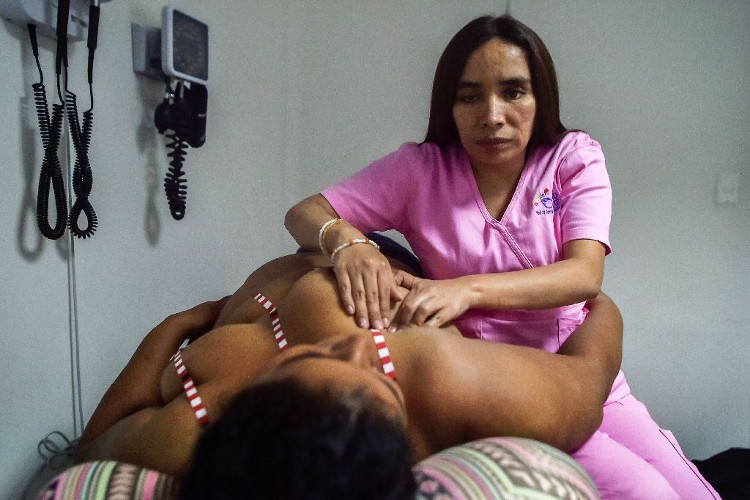'Weapons' detect cancer of blind women
Losing the eyes but possessing superior touch, five blind women in Colombia were trained to screen by hand.
One morning in 2011, Leidy Garcia woke up, finding himself no longer seeing. At the same time, Francia Papamija also began life in the dark.
Illness causes two women to lose their eyes but contribute to sharpening their touch. Along with three others, Garcia and Papamija are specially trained to screen.

Papamija checks the chest for patients.(Photo: AFP).
According to AFP, the method of using blinds to detect cancer was made by Dr. Frank Hoffman (Germany) a decade ago after finding they possess the ability to identify small tumors , the first sign of warning. cancer.
"The patient has an extremely sensitive eye defect , " said Luis Alberto Olave, surgeon and Hands Save Lifes project coordinator at the Hospital San Juan de Dios (Colombia). " They feel and distinguish things very well."
Dr. Hoffman's method was tested in Germany, Austria and South America. In Colombia, five blind women aged 25 to 35 who do not have vascular or neurological problems are selected to participate in special training and become "tactile assistants".
To date, five tactile assistants have examined health for more than 900 women. Each visit, they carefully touch, straighten the patient's chest and mark the location where the tumor can appear with yellow or red tape. If you are sure of the abnormal signs, the assistants will quickly inform the doctor to request a test.
A test with a tactile assistant lasts about 45 minutes. Compared to the traditional 10-minute examination at the hospital, this method is rated as a better result."Such clinical examination is very complicated and requires a lot of time," Mr. Olave said.
In particular, the test showed that blind people discovered very small tumors, only about 8 mm, but both the doctor and the patients themselves were bundled."People often let themselves be led by what they see. And we only believe in what we touch and hear , " Garcia said.
Besides, mammograms are currently only popular in developed countries. For developing countries that are limited in science and technology such as Colombia, screening for early detection of breast cancer is even more important.
Not only fighting against cancer, women like Garcia and Papamija are trying to eliminate stigma. " We are gradually breaking the notion that people with disabilities cannot think or do anything on their own," Papamija said.
In fact, before becoming tactile assistants, both Garcia and Papamija were unemployed like hundreds of thousands of other disabled people.
Colombia is expected to launch a new tactile assistant training program in 2018.
- More than 1 million American women have treated excessive cancer
- 3D ultrasound helps detect breast cancer early
- 6 common cancers in women
- Find out how to detect cancer early
- Detect cervical cancer using vinegar
- Why are more men dying of cancer than women?
- Thyroid cancer: How to detect and treat
- 2 types of cancers that women with long legs are often prone to
- Early detection of cancer by virus test
- Nano-electronics can detect the risk of stomach cancer
- 'Da nano' blocks biochemical weapons
- Detection and prevention of cervical cancer
 Why is Australia the country with the highest cancer rate in the world while Vietnam ranks 100th?
Why is Australia the country with the highest cancer rate in the world while Vietnam ranks 100th? New drug causes cancer to 'starve'
New drug causes cancer to 'starve' Common cancers in men
Common cancers in men America's incredible discovery: The most feared cancer cell is love
America's incredible discovery: The most feared cancer cell is love